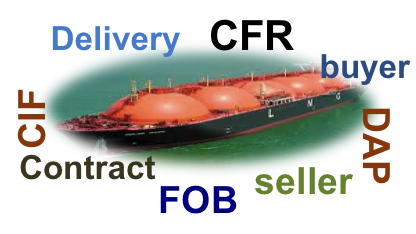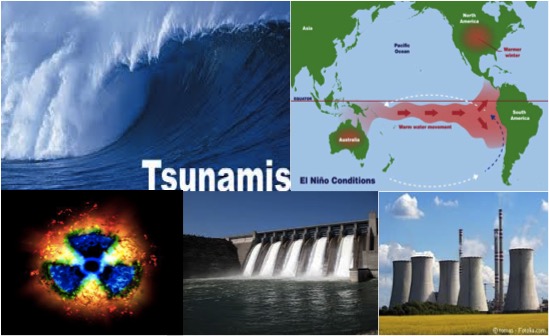The majority of LNG transactions are delivered under few types of contracts: FOB, DAP, CIF and CFR. Since 1st January 2011 DAP rule replaced the former DES rule that was a term frequently used. This article summarises these concepts.
The International Chamber of Commerce (ICC) developed the Incoterms® rules to give clarity to the terms of negotiations between sellers and buyers in different types of transportation around the world. The Incoterms® rules are periodically revised. In the last version Incoterms® 2010, that became effective as of January 1, 2011, rules have been reduced from 13 to 11.
Incoterms® 2010 rules eliminated four Incoterms® 2000 rules DAF (Delivered at Frontier), DES (Delivered Ex-Ship), DEQ (Delivered Ex Quay) and DDU (Delivered Duty Unpaid) and introduced two new ones: DAT (Delivered at Terminal) and DAP (Delivered at Place).
Under DAT rule, delivery occurs at the buyer’s disposal unloaded from the arriving vehicle (as former DEQ) and under DAP rule, delivery occurs at buyer’s disposal but ready for unloading (as former DES).
DES was mainly used when seller owned the vessel. On both DAP and former DES rules seller bears al the costs and risks associated with bringing the goods to the named destination. The seller is responsible of cost, risk and title until arrival of the vessel at the delivery port, but buyer pays to unload plus taxes, customs duties, etc.
The 11 Incoterms® 2010 rules are divided in two groups:
Incoterms for any mode or modes of transport:
- EXW Ex Works
- FCA Free Carrier
- CPT Carried Paid To
- CIP Carriage and Insurance Paid to
- DAT Delivered At Terminal
- DAP Delivered At Place
- DDP Delivered Duty Paid
Incoterms only for sea and inland waterway transport:
- FAS Free Alongside Ship
- FOB Free On Board
- CFR Cost and Freight
- CIF Cost, Insurance and Freight
A short description found below of the 11 rules from the Incoterms® 2010 edition can be found on the ICC’s web site and the ICC Business Bookstore.(http://www.iccwbo.org/products-and-services/trade-facilitation/incoterms-2010/the-incoterms-rules/)
RULES FOR ANY MODE OR MODES OF TRANSPORT
- EXW Ex Works
“Ex Works” means that the seller delivers when it places the goods at the disposal of the buyer at the seller’s premises or at another named place (i.e.,works, factory, warehouse, etc.). The seller does not need to load the goods on any collecting vehicle, nor does it need to clear the goods for export, where such clearance is applicable.
- FCA Free Carrier
“Free Carrier” means that the seller delivers the goods to the carrier or another person nominated by the buyer at the seller’s premises or another named place. The parties are well advised to specify as clearly as possible the point within the named place of delivery, as the risk passes to the buyer at that point.
- CPT Carriage Paid To
“Carriage Paid To” means that the seller delivers the goods to the carrier or another person nominated by the seller at an agreed place (if any such place is agreed between parties) and that the seller must contract for and pay the costs of carriage necessary to bring the goods to the named place of destination.
- CIP Carriage And Insurance Paid To
“Carriage and Insurance Paid to” means that the seller delivers the goods to the carrier or another person nominated by the seller at an agreed place (if any such place is agreed between parties) and that the seller must contract for and pay the costs of carriage necessary to bring the goods to the named place of destination.
‘The seller also contracts for insurance cover against the buyer’s risk of loss of or damage to the goods during the carriage. The buyer should note that under CIP the seller is required to obtain insurance only on minimum cover. Should the buyer wish to have more insurance protection, it will need either to agree as much expressly with the seller or to make its own extra insurance arrangements.”
- DAT Delivered At Terminal
“Delivered at Terminal” means that the seller delivers when the goods, once unloaded from the arriving means of transport, are placed at the disposal of the buyer at a named terminal at the named port or place of destination. “Terminal” includes a place, whether covered or not, such as a quay, warehouse, container yard or road, rail or air cargo terminal. The seller bears all risks involved in bringing the goods to and unloading them at the terminal at the named port or place of destination.
- DAP Delivered At Place
“Delivered at Place” means that the seller delivers when the goods are placed at the disposal of the buyer on the arriving means of transport ready for unloading at the named place of destination. The seller bears all risks involved in bringing the goods to the named place.
- DDP Delivered Duty Paid
“Delivered Duty Paid” means that the seller delivers the goods when the goods are placed at the disposal of the buyer, cleared for import on the arriving means of transport ready for unloading at the named place of destination. The seller bears all the costs and risks involved in bringing the goods to the place of destination and has an obligation to clear the goods not only for export but also for import, to pay any duty for both export and import and to carry out all customs formalities.
RULES FOR SEA AND INLAND WATERWAY TRANSPORT
- FAS Free Alongside Ship
“Free Alongside Ship” means that the seller delivers when the goods are placed alongside the vessel (e.g., on a quay or a barge) nominated by the buyer at the named port of shipment. The risk of loss of or damage to the goods passes when the goods are alongside the ship, and the buyer bears all costs from that moment onwards.
- FOB Free On Board
“Free On Board” means that the seller delivers the goods on board the vessel nominated by the buyer at the named port of shipment or procures the goods already so delivered. The risk of loss of or damage to the goods passes when the goods are on board the vessel, and the buyer bears all costs from that moment onwards.
- CFR Cost and Freight
“Cost and Freight” means that the seller delivers the goods on board the vessel or procures the goods already so delivered. The risk of loss of or damage to the goods passes when the goods are on board the vessel. the seller must contract for and pay the costs and freight necessary to bring the goods to the named port of destination.
- CIF Cost, Insurance and Freight
“Cost, Insurance and Freight” means that the seller delivers the goods on board the vessel or procures the goods already so delivered. The risk of loss of or damage to the goods passes when the goods are on board the vessel. The seller must contract for and pay the costs and freight necessary to bring the goods to the named port of destination.
‘The seller also contracts for insurance cover against the buyer’s risk of loss of or damage to the goods during the carriage. The buyer should note that under CIF the seller is required to obtain insurance only on minimum cover. Should the buyer wish to have more insurance protection, it will need either to agree as much expressly with the seller or to make its own extra insurance arrangements.”


